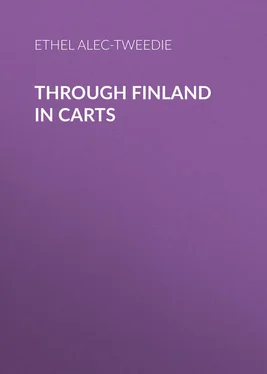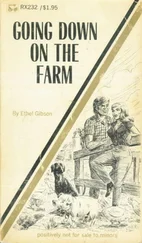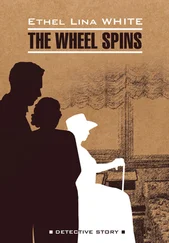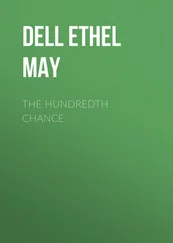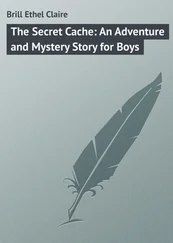Ethel Alec-Tweedie - Through Finland in Carts
Здесь есть возможность читать онлайн «Ethel Alec-Tweedie - Through Finland in Carts» — ознакомительный отрывок электронной книги совершенно бесплатно, а после прочтения отрывка купить полную версию. В некоторых случаях можно слушать аудио, скачать через торрент в формате fb2 и присутствует краткое содержание. ISBN: , Жанр: Путешествия и география, foreign_antique, foreign_prose, foreign_language, на английском языке. Описание произведения, (предисловие) а так же отзывы посетителей доступны на портале библиотеки ЛибКат.
- Название:Through Finland in Carts
- Автор:
- Жанр:
- Год:неизвестен
- ISBN:http://www.gutenberg.org/ebooks/27743
- Рейтинг книги:3 / 5. Голосов: 1
-
Избранное:Добавить в избранное
- Отзывы:
-
Ваша оценка:
- 60
- 1
- 2
- 3
- 4
- 5
Through Finland in Carts: краткое содержание, описание и аннотация
Предлагаем к чтению аннотацию, описание, краткое содержание или предисловие (зависит от того, что написал сам автор книги «Through Finland in Carts»). Если вы не нашли необходимую информацию о книге — напишите в комментариях, мы постараемся отыскать её.
Through Finland in Carts — читать онлайн ознакомительный отрывок
Ниже представлен текст книги, разбитый по страницам. Система сохранения места последней прочитанной страницы, позволяет с удобством читать онлайн бесплатно книгу «Through Finland in Carts», без необходимости каждый раз заново искать на чём Вы остановились. Поставьте закладку, и сможете в любой момент перейти на страницу, на которой закончили чтение.
Интервал:
Закладка:
All along the line there ran a sort of tumbledown wooden fencing, loosely made, and about four or five feet high, meant to keep back the snow in winter. The very thought of snow was refreshing on that broiling day.
As we gasped with the heat, and pondered over the scrambled meal at Jaakkima , we listened to the strangely sad but entrancing singing of a number of peasants in the next waggon, all bound like ourselves for Sordavala , although they were really rehearsing for the Festival, while we were drowsily proceeding thither merely as spectators.
How they flirted those two on the bridge outside our carriage. Spite of the hard outlines of her face, and her peculiarly small Finnish eyes, the maiden managed to ogle and smile upon the guard standing with his hands upon the rail; so slender was the support, that it seemed as if he might readily fall off the train and be killed by the wheels below. The flirtation was not only on her side, for presently he took her hand, a fat little round hand, with a golden circle upon one of the fingers, which denoted betrothal or marriage, and pressed it fondly. We could not understand their Finnish speech; but there is a language comprehensible to all, in every clime. That the pair were in love no one could for a moment doubt, and that they heeded nothing of those quaint old Finnish chants, distinctly audible from the opposite carriage, was evident, for they talked on and on.
We passed Niva ; here and there the waters of a lake glinted in the sunshine, or a river wound away to the sea, strewn with floating wood, as though its waters were one huge raft.
The singing ceased; save the merry laugh of the Finnish girl, nothing but the click-cluck-click of the wheels was audible. The guard leaned over her, whispered in her ear, then, as if yielding to some sudden impulse, pressed her to his heart; and, still to the accompaniment of that endless click-cluck-click, implanted a kiss on her full round lips. For a moment they stood thus, held in warm embrace, muttering those sweet nothings which to lovers mean all the world.
Suddenly the door behind them opened, and one of the singers, nervous and excited from the long practice of his national airs, came upon the bridge to let the gentle zephyrs cool his heated brow.
All smiles, this sunburnt blonde, whose hair fell in long locks, cut off straight, like the ancient saints in pictures, stood before us – his pink flannel shirt almost matching the colour of his complexion.
In a moment all was changed; his happy smile vanished into a glance of deadly hate, the colour fled from his face, leaving him ashy-pale, fire literally shot from his eyes as he gazed upon his affianced bride; but he did not speak.
His hand violently sought his belt, and in a moment the long blade of one of those Scandinavian puukko – knives all peasants use – gleamed in the sunshine. For an instant he balanced it on high, and then, with a shriek more wild than human, he plunged the blade deep down into his betrothed's white breast.
Like a tiger the guilty guard sprang upon him; madly they fought while the girl lay still and senseless at their feet, a tiny stream of blood trickling from her breast.
Northern rage once roused is uncontrollable; and there, on the bridge of the moving train, those two men struggled for mastery, till – yes, yes – the light railing gave way, and together the hater and the hated fell over the side, and were cut to pieces by the wheels.
What a moment! a groan, a piercing shriek, rent the air!
Then, with a gasp, hot and cold, and wet by turns, I woke to find it was all a dream!
The run to Sordavala proved a hot and tedious journey of seven hours, but even dusty railway journeys must come to an end, and we arrived at our destination in Eastern Finland about three o'clock.
The crowd at the country station was horrible, and the clamour for cabs, carts, and the general odds and ends of vehicles in waiting to transfer us to our destination, reminded us much of Ober Ammergau on a smaller scale.
This Sordavala festival is really the outcome of an old religious ceremony, just as the Welsh Eisteddfod is a child of Druidical meetings for prayer and song. In ancient days bards sang and prayed, and now both in Finland and in England the survival is a sort of musical competition.
Our Eisteddfod, encouraged by the landed proprietors of Wales, forms a useful bond between landlord and tenant, employer and employed. It is held yearly, in different towns, and prizes are given for choir singing, for which fifty to a hundred voices will assemble from one village, all the choirs joining together in some of the great choruses. Rewards are also given for knitting, for the best national costumes, for solo singing, violin and harp playing, for original poems in Welsh, and for recitations.
In Finland the competition, strangely enough, also takes place once a year, and dates back to the old Runo Singers, who orally handed down the national music from generation to generation. Each time the Festival is, as in Wales, held in a different town, the idea being to raise the tastes of the populace, and to encourage the practice of music among a thoroughly musical people. Clubs or choirs are sent from all corners of Finland to compete; the old national airs – of which there are hundreds, ay thousands – are sung, and that unique native instrument the Kantele is played. For hundreds of years these Runo Singers have handed on the songs of their forefathers by word of mouth, and have kept their history alive.
It was Elias Lönnrot who collected these Kantele songs. For years and years he travelled about the country gathering them together by ear and word of mouth, and, having weeded out the repetitions, he edited the famous epical Kalevala , and later collected quantities of other lyric ballads from the heathen times, and published them as Kanteletar . Thus much ancient music and verse was revived that had almost been forgotten. But of this we must speak in the next chapter.
That Finland is thoroughly musical may be inferred from the dozens of choirs sent to the Sordavala Festival from all parts of the country. The peasant voices, in spite of being but slightly trained, or at all events trained very little, sing together wonderfully. Indeed, it was surprising to find how they could all take their proper parts, and keep to them; but the supreme delight, perhaps, of the Festival was the student corps, composed of fifty men from the University of Helsingfors , who sang together most beautifully, the choir being conducted by one of themselves. They had some glorious voices among them, and as they sang the national airs of Finland, marching backwards and forwards to the park, their feet keeping time with their music, the effect of their distant singing in the pine-woods was most enthralling.
Strangely enough, when they went to sing on the public platform raised in the park for the occasion, they wore evening dress and white gloves. Dress-clothes are somewhat of a rarity in Finland, as they are in many other continental countries; but there they stood in a semicircle on the dais, each man with his white velvet student cap in his hand, and, to the spectators, standing a little in the distance, the effect of snowy-white shirt, white gloves, and white cap shown up in the glancing sunbeams by black clothes, was somewhat funny.
The performers met with tremendous applause, and certainly deserved it. Although German students often sing beautifully, and are indeed famous for their rendering of the Volkslieder , those from Helsingfors sang as well if not better.
We often dined at the same hotel where they lodged, during the week, and when they marched in they sang a grace. After they had finished their dinner, they generally, before leaving, sang two or three songs by special request of visitors dining at the various tables.
Читать дальшеИнтервал:
Закладка:
Похожие книги на «Through Finland in Carts»
Представляем Вашему вниманию похожие книги на «Through Finland in Carts» списком для выбора. Мы отобрали схожую по названию и смыслу литературу в надежде предоставить читателям больше вариантов отыскать новые, интересные, ещё непрочитанные произведения.
Обсуждение, отзывы о книге «Through Finland in Carts» и просто собственные мнения читателей. Оставьте ваши комментарии, напишите, что Вы думаете о произведении, его смысле или главных героях. Укажите что конкретно понравилось, а что нет, и почему Вы так считаете.
